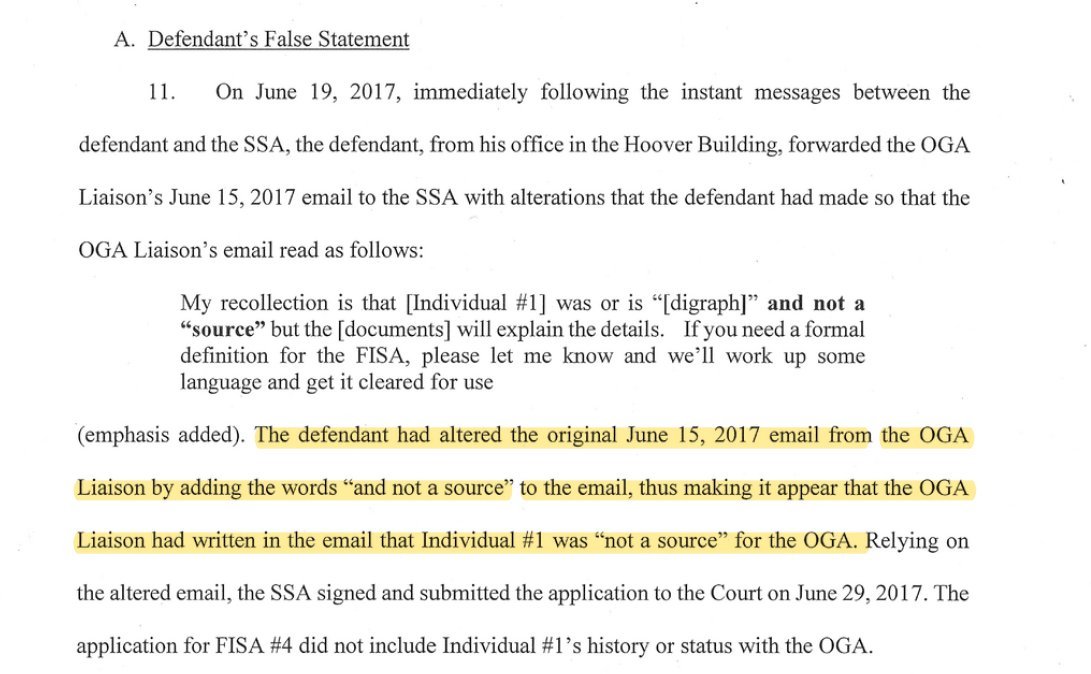ThomassRichards Categories Society
Hard-left National Education Union opposes schools reopening even if all teachers get a priority jab. Schools clearly an inconvenience for teachers\u2019 union, since they only get in the way of its real passion \u2014 political activism. It would help NEA if we just closed schools forever
— Andrew Neil (@afneil) January 31, 2021
You clearly don’t care about people’s lives; you just want the chance to have a go at a trade union. FYI, schools need to be made SAFE b4 reopening. 2/
You must’ve seen the figures: Covid cases increased via schools after reopening in September & cases are now increasing in nurseries, left open since Xmas. 3/
Why hurt or kill more people? Ensure safety FIRST. 4/
How to make schools SAFE? a) Vaccinate all school staff & all students, with both vaccine shots. That'll take us until May as second shots are only being given after 3 months. 5/
A few quick responses to some pointing out it could be even better (more/cheaper/single-dose) 1/
The first shipment of 1 million doses of the #OxfordAstraZeneca vaccine from the @SerumInstIndia is on the way to @ortambo_int
— South African Government (@GovernmentZA) January 31, 2021
The shipment left the Chhatrapati Shivaji Maharaj International Airport in Mumbai today and will arrive in South Africa on 1 February 2021.#COVID19 pic.twitter.com/lTw1EtGi0d
The Ox/AZ/SerumInst deal is incredibly radical- Ox opted out of £££ to make a brand new product available around the world not-for-profit. Please judge imperfections by comparison to Pfizer/Moderna, not vs an imaginary ideal or a company which hasn’t yet delivered any doses.
Quibble #1: ‘It needs 2 doses’. Ox/AZ haven’t done as good a PR job on this as J&J, but the vaccines are similar. Published Ox data shows substantial single dose efficacy if you read tables carefully. Further analysis will be done soon. 2/
And I think all vaccines incl J&J will need boost for optimal long-term effect. 3/
Quibble #2: ‘But Serum Inst are charging more to SA than AZ are charging others’. Firstly, the product remains cheaper, I think, than anything else in market, or many older vaccines which haven’t had the recent R&D costs. 4/
Survey Says: Never Tweet https://t.co/DhnPgWPGWh
— Ben Smith (@benyt) February 1, 2021
2/11 Qualitative scholars, including critical theorists, acknowledge their own social locations relative to the subjects at hand, empowering readers to ferret out not so much bias as the perspective from which authors perceive their topics. It's a necessary honesty.
3/11 We should note here further that quantitative scholars do not escape bias. They are merely excused from the requirement to talk or even think about that bias.
Numbers *never* tell a whole story. Statistics are about aggregates.
4/11 Indeed #neoliberalism's failing lies in a presumption that even if a rising tide fails to lift all boats, it lifts *most* of them, and therefore it adopts a prescription on utilitarian grounds.
5/11 But #neoliberalism turns out to sink far too many other boats, in actuality, a majority of boats while mistaking the extreme lifting of a few outlying boats for the lifting of most or all.
Economists are coming to understand this even if politicians choose not to.
A dozen hospital chains just presented at #JPM21, two weeks ago.
General theme: Financially speaking, hospitals are doing quite well. 1/n
The new GOP Covid-19 relief offer includes the $20B that Biden asked for on vaccine distribution, and also calls for $35 billion in new grants for hospitals and health providers that wasn't included in Biden's plan pic.twitter.com/DMjVPahc64
— Rachel Cohrs (@rachelcohrs) February 1, 2021
We have, for example, Community Health Systems, which operates 89 hospitals in 16 states, many of them in smaller towns / metro areas.
Through the pandemic, CHS's EBITDA margin never even fell into single digits, and profitability actually *increased* in 2020.
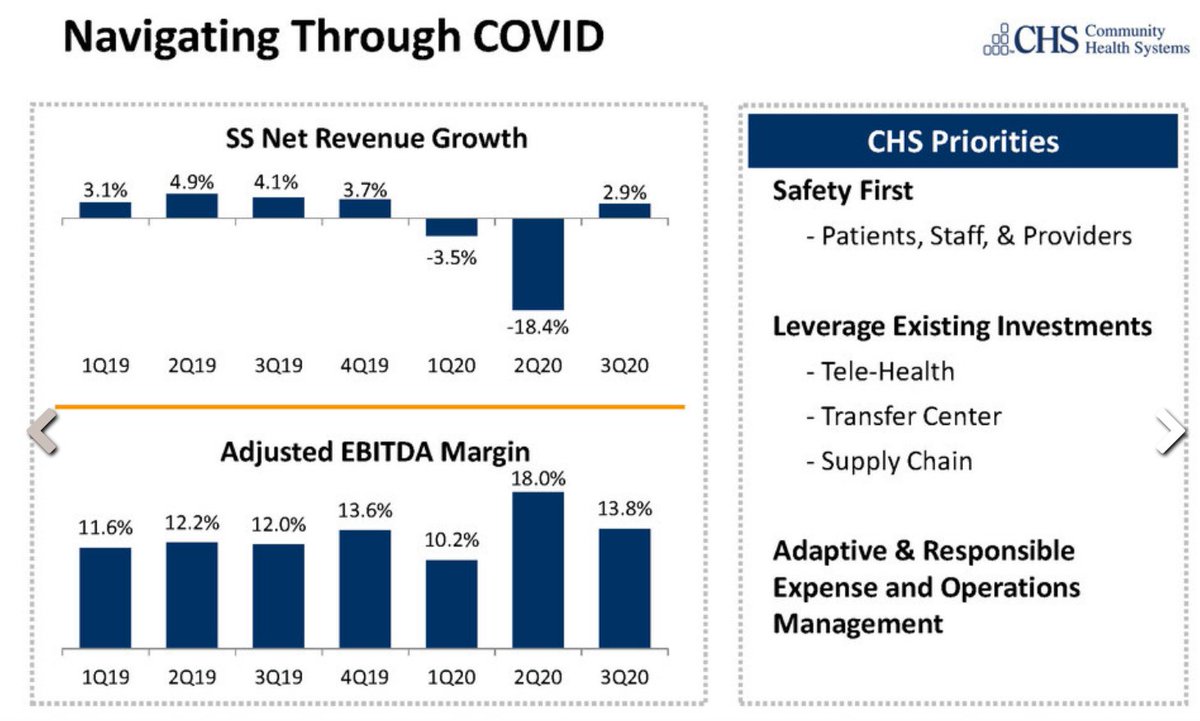
Meanwhile, Lifepoint Health (84 hospitals, 30 states) also saw profits increase in 2020, while its cash-to-debt ratio fell. Pretty solid year.
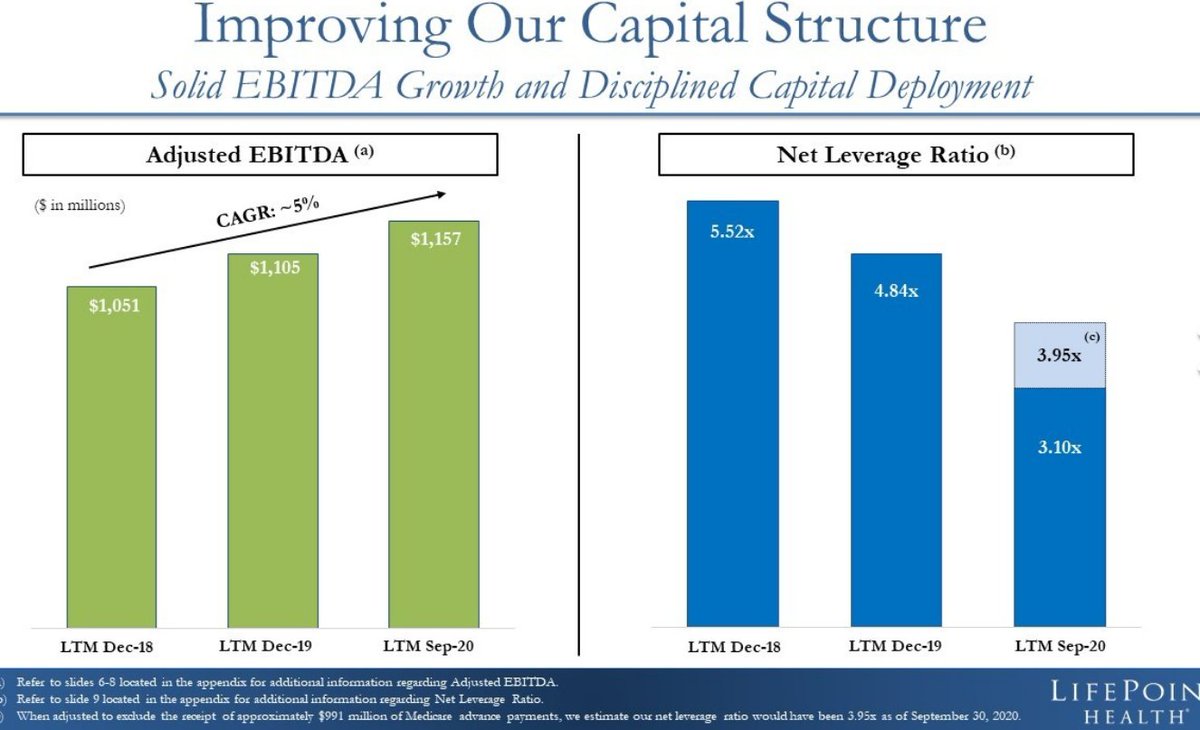
ProMedica Health (non-profit, 13 Midwestern hospitals) actually saw profits increase even in *the first half of 2020,* when hospitals were supposedly facing catastrophe.
They finished the year with ~$440M of EBITDA, and $2.3B of cash on hand.

Baylor Scott & White (52 hospitals) saw its profit margin *more than double* during the pandemic year, and ended September with $7.8 billion of cash and portfolio investments.
That's about $600M more than they had pre-pandemic.
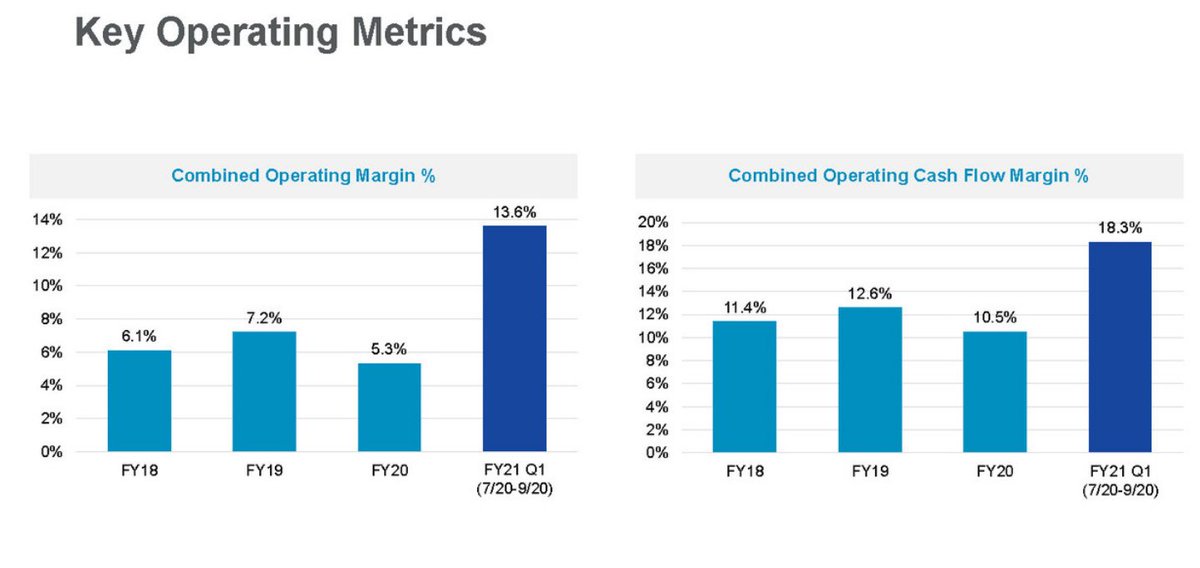
Once they get statehood this city taxes will be higher than California and New York combined. You know what that means? Redistricting back to md/va.
This will be a disaster for black DC and the mayor will not care.
Today, we\u2019re introducing #S51 in the United States Senate because it is past time to make #DCStatehood a reality. https://t.co/XM5AcpR5gz
— Chuck Schumer (@SenSchumer) January 27, 2021
Ps the only thing mayor bowser wants is to be governor. She will sweep the homeless out to md/va faster than she does now. Oh ps she also dumps her problems in va when it comes to vaccines and gave under age children the right to inoculations w/o parents consent.
1) How about we view everything from a higher perspective and get some better context on the situation?
The retroactive cancellation of the Keystone XL permit creates a dangerous precedent.
— Jason Kenney (@jkenney) January 30, 2021
Enbridge Line 5, which supplies Alberta energy to Midwest US & eastern Canada, is also under attack.
Canada must stand up & defend this critical energy infrastructure.https://t.co/UbjYWNa4Mf
Pressure is mounting on President Biden to enact leadership changes at the U.S. Postal Service, including one Democratic lawmaker who's calling on Biden to fire the postmaster general and the entire board of governors. https://t.co/3cwqGOMvQH
— NPR Politics (@nprpolitics) January 29, 2021
2/ She pointed to a recent report she authored for @PubInterest about Koch's efforts to popularize the fringe idea of privatizing the Postal Service and to capture the agency.
3/ When regulatory capture occurs, a special interest is prioritized over the general interests of the public. In 2006, one of his pro-privatization allies "James Miller was rewarded with a post on the Board of Governors for the Postal Service."
4/ "And from that perch in 2006, he pushed through this bill called the Postal Accountability and Efficiency Act, the PAEA, which really has dramatically harmed our Postal Service."
5/ Some people might say that they were trying to assure the failure of the Postal Service with the bill, which loaded it with burdens for the future that are not asked of any other government agency.
Records we obtained show some state officials were “absolutely apoplectic” about the mailer.
#FOIAFriday
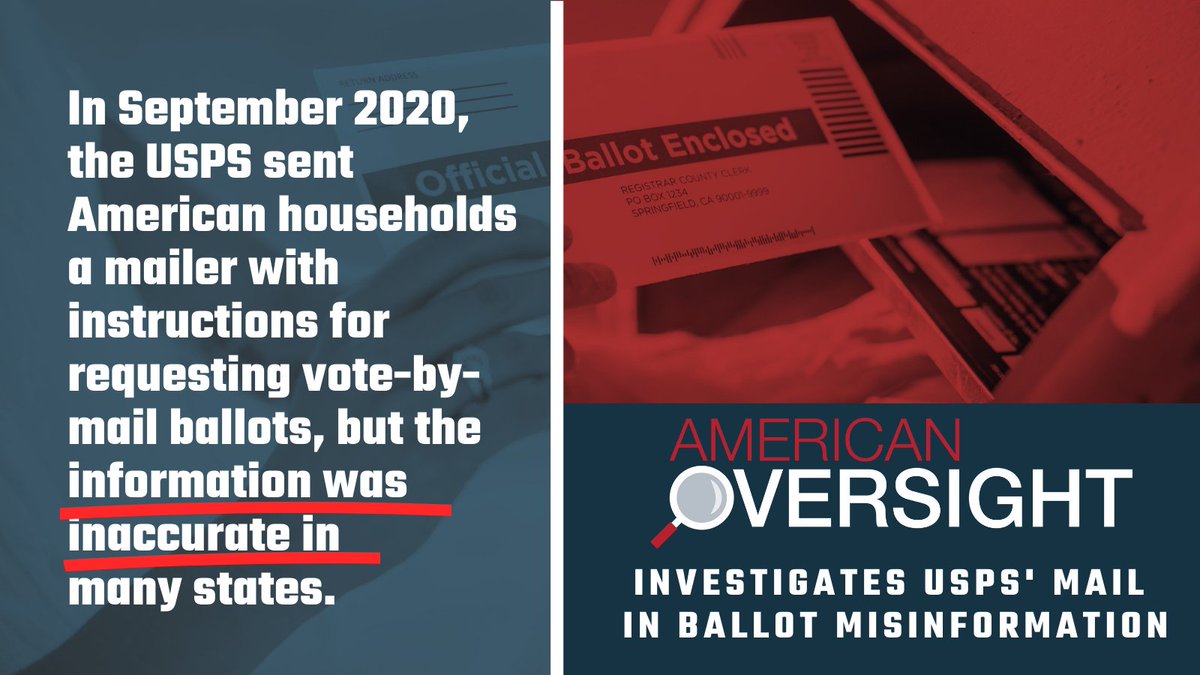
The mailers told voters to "request your mail in ballot... at least 15 days before Election Day." But that’s inaccurate for Americans living in the nine states and District of Columbia that automatically mail ballots to registered voters.
https://t.co/40sz60kqyF
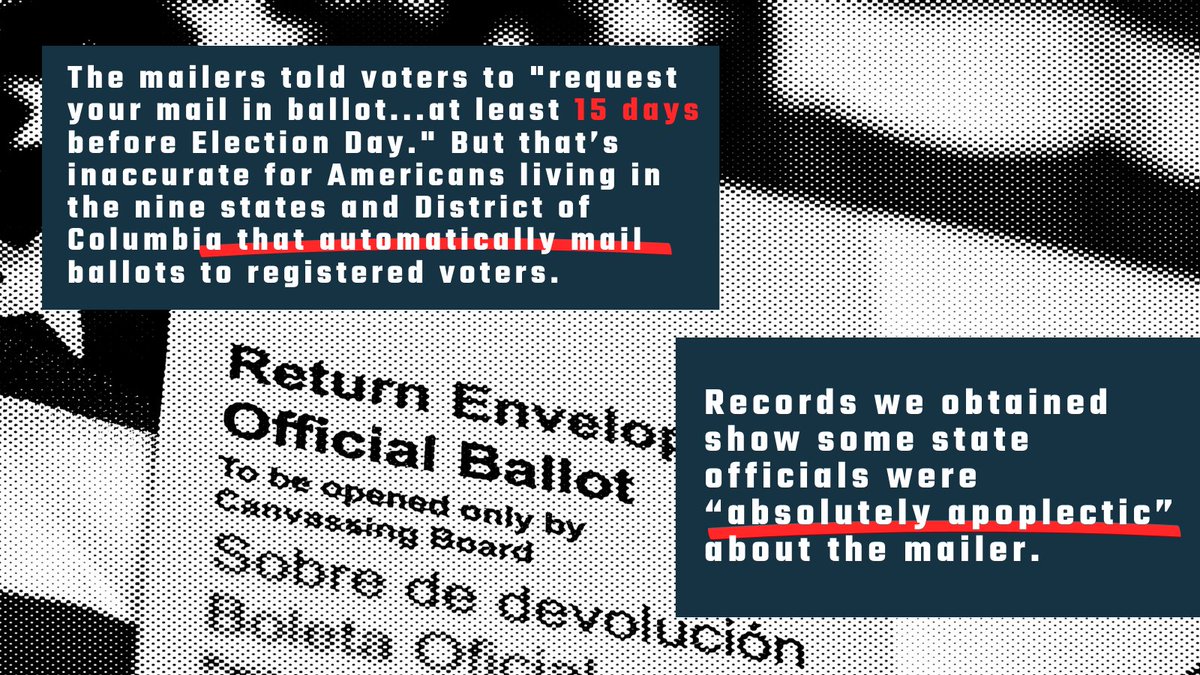
Colorado Sec. of State Jena Griswold sued USPS, arguing the mailer attempted to disenfranchise voters with misleading information. We asked the Colorado State Dept. for emails with USPS in anticipation of widespread use of mail-in ballots in the election.
Here’s what the records we uncovered show:
Colorado’s state election director Judd Choate told USPS Director of Election and Political Mail Justin Glass that he was “absolutely apoplectic about the pre-election postcard I just learned about...”
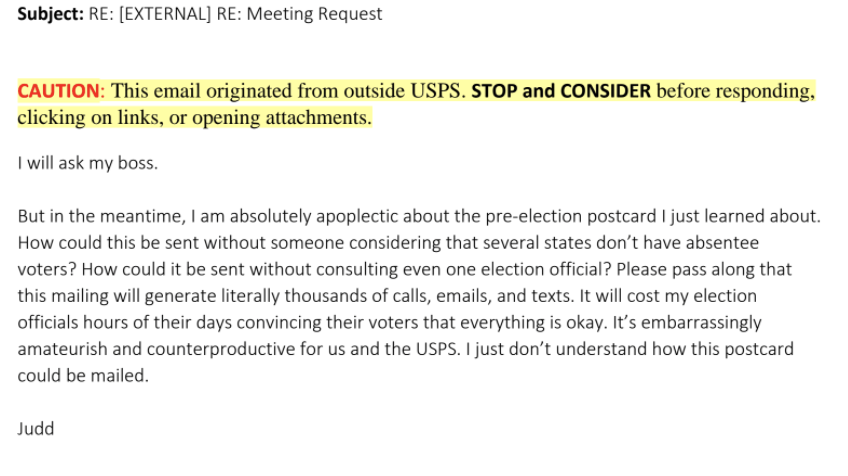
”How could this be sent without someone considering that several states don’t have absentee voters? How could it be sent without consulting even one election official? Please pass along that this mailing will generate literally thousands of calls, emails, and texts...”
But it misses some key aspects of what makes the movement distinctive, and distinct from London's municipal socialism.
So here’s a thread on municipalism...
"Politically, socialist municipalism is fundamentally different than the elitist, real-estate-allied stance toward urban development that has come to be known as \u2018urbanism'."@owenhatherley's Red Metropolis reviewed by @davidjmadden for @jacobinmag. \U0001f3d7\ufe0f https://t.co/yF5IZa0FmD
— Repeater Books (@RepeaterBooks) January 26, 2021
Municipalism is not simply “a political stance as well as an approach to shaping the built environment” (as @davidjmadden puts it) – it’s a distinctive strategic approach to democratising the local state and transforming urban economies using urban spaces as a platform…
1/
Municipalism adopts a ‘dual power’ strategy: 1) supporting commons and practices of commoning through which a more democratic, cooperative (and potentially prefiguratively postcapitalist) ‘solidarity economy’ can be instituted;
2/
...and 2) seeking to take hold of the political institutions of the local state through mobilising social movements for winning electoral office, to reimagine and transform the state from within, through guerrilla occupation of bureaucracies, in order to support 1) above.
3/
Means and ends are intertwined in a prefigurative politics that ‘feminises’ the state’s decision-making processes and subverts technocratic managerialism in favour of 'collective theory-building' and open-source, crowdsourced deliberative-democratic policy-making.
4/













